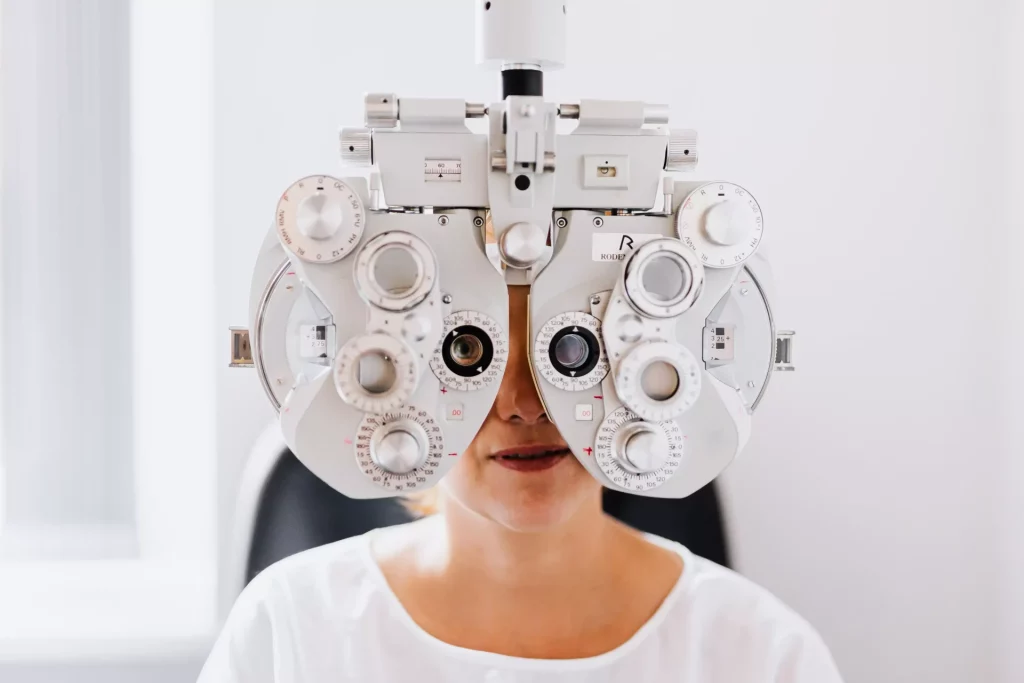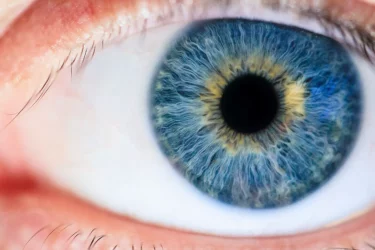They say that the eyes are the window to the soul, and while this article might not be as poetically profound, there is some truth to the saying. That’s because having regular eye health check-ups is essential. They aren’t only important for your eyes and vision but these examinations can be used to identify general health conditions too.
Join us as we explore some of the different health issues that eye tests can identify, how often you should attend check-ups, and why it’s so important.

Why are health checks important?
Eye health checks are a quick and easy way to spot any eye health conditions before they become a bigger problem. Think of it like your annual trip to the dentist, or having a chat with your GP about that lingering cold.
The benefits of having regular eye tests
Eye tests can:
- identify any vision problems or sight loss
- check for eye conditions, diseases or damage
- spot the early signs of many overall health conditions
- ensure early diagnosis and treatment to prevent more serious sight loss or damage
- determine if you need an updated prescription for your glasses or contact lens.
Types of eye health checks
There are a few different types of eye appointments available to you. These can test different areas of your eyes and identify a range of potential issues. Here’s a rundown of the check-ups your optician might recommend.
A general eye examination
A standard eye exam is like a general check-up. These ensure there are no signs of eye problems. This type of test is aimed at people without pre-existing eye conditions.
A more comprehensive eye exam
You can also opt for a more advanced eye exam that might include tests for a wider range of conditions. These might include the close examination of the optic nerve via retinal imaging or check the shape of your cornea. This might be a good idea if you are experiencing specific symptoms or think you might have an issue with your eyes.
Vision testing – refraction
This is a standard sight test performed by an optometrist to check your vision. He or she will also look for any changes in your eyes while assessing your current glasses or contact lens prescription. This test might involve reading numbers, letters or symbols from a chart whilst looking through different distance lenses.
Your peripheral vision may also be tested with a machine that asks you to click a button every time you see a light.
Autorefraction test
Your optometrist may also use a computer to see how light passes through your eyes. This is to help find the right prescription strength for you.
Eye pressure test – Tonometry
To test your eye pressure, the optometrist will blow a small puff of air into each eye at the cornea. It might not sound very pleasant, but this is to measure Intraocular Pressure (IOP) which can help determine if you need further tests for glaucoma or other eye conditions.
Binocular vision test
There are multiple tests that can be used to check your binocular vision (how your eyes work together). Your optometrist may ask you to follow a light with your eyes whilst keeping your head still. They may also ask you to focus on the letter chart whilst covering and uncovering each eye.
Retinal OCT scans
Some people may require a scan of the retina and optic nerve to check for conditions such as glaucoma or macular degeneration. OCT stands for Optical Coherence Tomography.
Slit lamp test
In this test, a microscope is used to look at the eye in more detail. The slit lamp can be used to look at the front of the eye, as well as the back of the eye when combined with a volk lens.
Can your eyes show health problems?
As mentioned above, eye tests can also show signs of other health issues. Optometrists are trained to identify many different conditions by looking at the different parts of your eyes.
Signs of underlying issues such as diabetes, high blood pressure and even brain tumours can be spotted during routine eye tests.
Common eye health problems and conditions
We’ve looked at some of the more general health issues regular eye tests can spot, now it’s time to reveal the common eye diseases and conditions that can be identified.
Macular degeneration
Age-related Macular Degeneration (AMD) is a painless condition that generally leads to the gradual impairment of central vision. Central vision is used for things like reading, recognising faces and other everyday tasks. It can be spotted during an eye test before symptoms even occur.
While Wet AMD treatment involves eye injections, unfortunately there are currently no treatments for Dry AMD.
Cataracts
Cataracts are a common eye condition. As you get older, the lens inside your eye gradually changes and becomes less transparent. This affects your ability to see. It can be treated through NHS service or via private cataract surgery.
Glaucoma
Glaucoma is a condition in the eye where the optic nerve becomes damaged. This can cause a loss of peripheral vision and is commonly caused by an increase in intraocular pressure inside the eye (IOP). Treatments may include eye drops or laser surgery. Vision loss through glaucoma cannot be reversed through eye surgery, so it’s important to catch it as early as possible.
Retinal detachment
This occurs when the retina separates from the back of the inside of your eye. If a retinal detachment is not diagnosed and treated quickly, it may result in a loss of some or all of the vision in the affected eye.
Diabetic retinopathy
Diabetic retinopathy is caused when high blood sugar levels damage the blood vessels supplying the back of the eye (the retina). It can cause complete vision loss if left untreated. You may not experience any symptoms during the early stages so it’s especially important for those with diabetes to get regular eye health checks.
The sooner you get a diagnosis for any of the above conditions, the sooner eye treatment can start, minimising any damage, complications or vision loss.
How to check your eye health
It’s vital you get your eyes checked by a professional optometrist or ophthalmologist, especially if you think there might be a problem. Optometrists spend several years studying different eye problems and are best-placed to take care of your eye health.
We also recommend sticking to the same practitioner where possible. That way, he or she will have your eye health records to hand and can see any changes or issues of concern.
There are some signs to watch out for that can indicate an eye health issue. If you notice any changes to your vision, unexpected flashing lights or redness and irritation, contact your optician.
How often should you have an eye health test?
You should aim to have regular eye exams at least every two years. You may need to get checked more frequently if:
- your optometrist has recommended it
- you notice changes to your vision
- you are over 60
- you have a family history of glaucoma and are over the age of 40
- you have any other risk factors.
When to have eye health checks
There is no ‘right’ time to get your eyes checked. However, if you notice any changes or have any concerns about your eyes, it’s important to arrange a test as soon as possible.
You should book an eye test if:
- your glasses or contact lenses don’t seem as effective
- you notice any changes to your vision
- you are experiencing regular or severe headaches
- you have red, dry, itchy or sore eyes
- your doctor has recommended it.
What happens during an eye health check?
Your eye test will vary slightly depending on the type of test you need, but the general process is as follows.
Pre-test assessment
Your test may start with your eye doctor or optometrist asking you to fill in a questionnaire about your lifestyle and health habits. The questions will likely cover:
- smoker status
- your daily screen time
- how much you exercise
- eye concerns
- medical history.
You may be asked to fill this out before your appointment or in the reception area.
The optometrist will use this information to help decide which tests you need, understand any issues you may be having and advise you on better eye care.
Eye tests
For the rest of the tests, you will usually be asked to move into a smaller, private room. For most of the tests, you will remain seated and may be asked to look through different lenses or place your chin on a rest at different machines. Your optometrist may look closely into your eye using a bright light to help them see better.
Your optometrist may check your current glasses or contact lenses to assess the prescription. You may undergo several vision tests to see if you need a new prescription.
Your eye doctor may also carry out tests to measure eye pressure and muscle strength. During a routine test, the optometrist may use an ophthalmoscope to look inside your eye by shining a light. Very occasionally, you may be asked to use dilating eye drops before the test.
Results
At the end of the appointment, you may be given a prescription for glasses or contact lenses or your current prescription may be altered. Your optometrist will explain what the prescription means and give you some information about getting your new eyewear.
Your optometrist will advise on your next check-up or about any necessary follow-up tests.
You may also be given a printed or digital report showing the results of your eye tests.
How long does an eye test take?
The length of your eye check will depend on your specific needs and the tests carried out. However, a general eye test for a healthy patient shouldn’t take much longer than 20 or 30 minutes.
Preparing for an eye check
Before going for your eye appointment, make sure you have any medical history or information to hand. It’s also a good idea to take the name of any medicines or eye drops you are using.
If you’re forgetful, you may also want to make a list of concerns or symptoms to ask your optometrist during the appointment.
Eye health check costs
The cost of your eye health check will depend on where you get it, where you live and what tests you need. They typically start from around £25.
Some people may be eligible for a free eye test on the NHS, including those over 60 or those under 18 and in full-time education. Check online or talk to your doctor to see if you qualify.
Find an eye health check near you
At Practice Plus Group, we operate four mobile eye clinics in various locations across the country. These provide assessment, diagnosis and treatment of Wet AMD and other conditions that affect the macula.
Our ophthalmology services are available to private and NHS patients. We welcome referrals from optometrists and doctors for any patient who has an eye-related condition listed below:
- Glaucoma
- Cataract (including YAG capsulotomy)
- Oculoplastics
- Wet AMD
- Vein occlusions
- Diabetic retinopathy
We deliver a comprehensive range of ophthalmic care services with short waiting times and excellent clinical outcomes. Explore our hospitals to find your nearest clinic.





